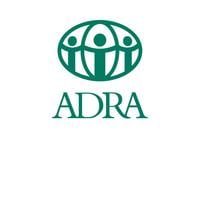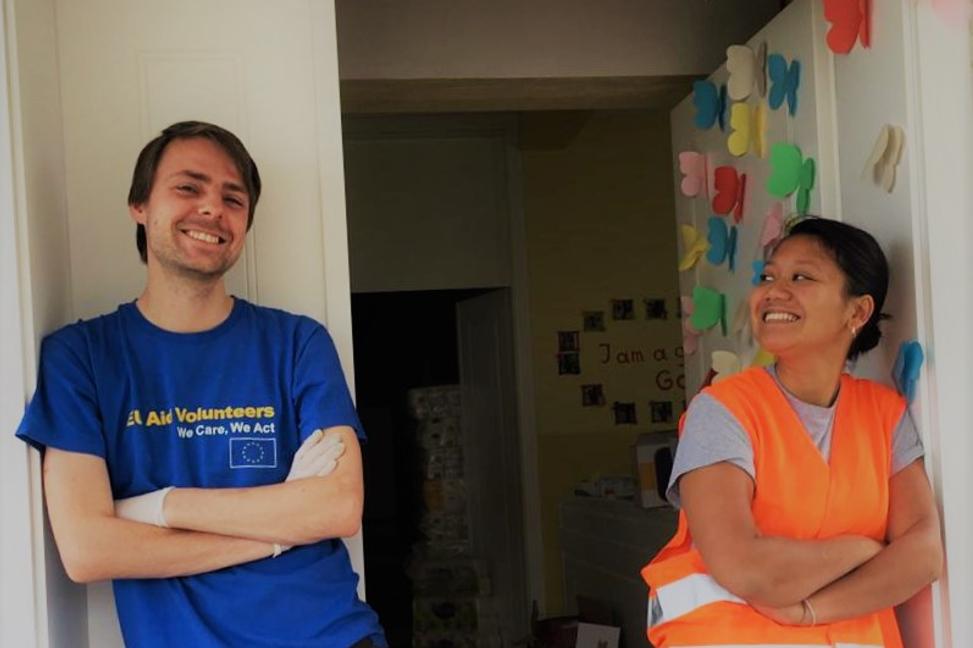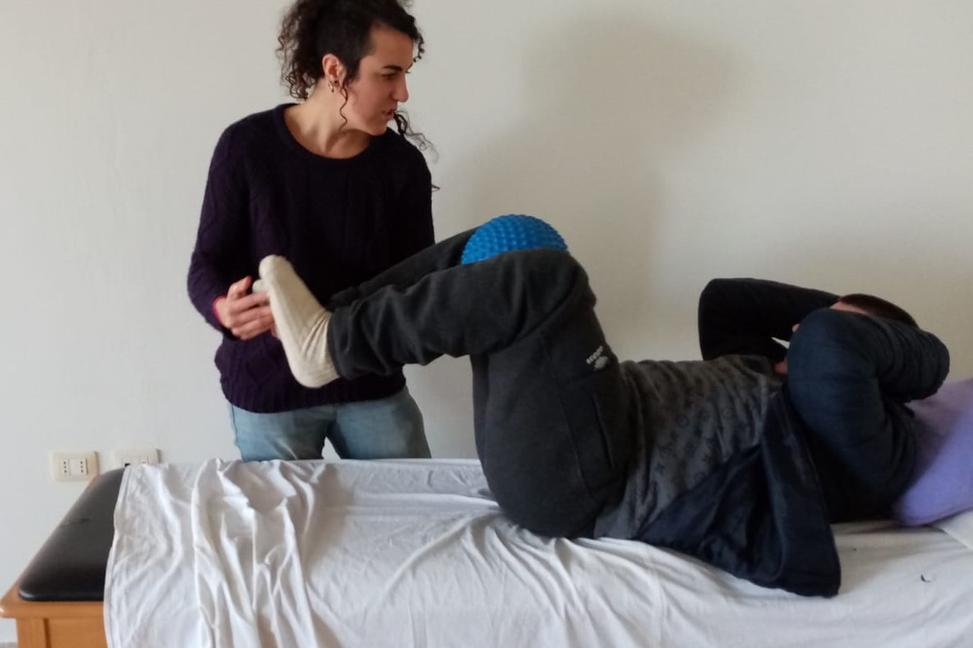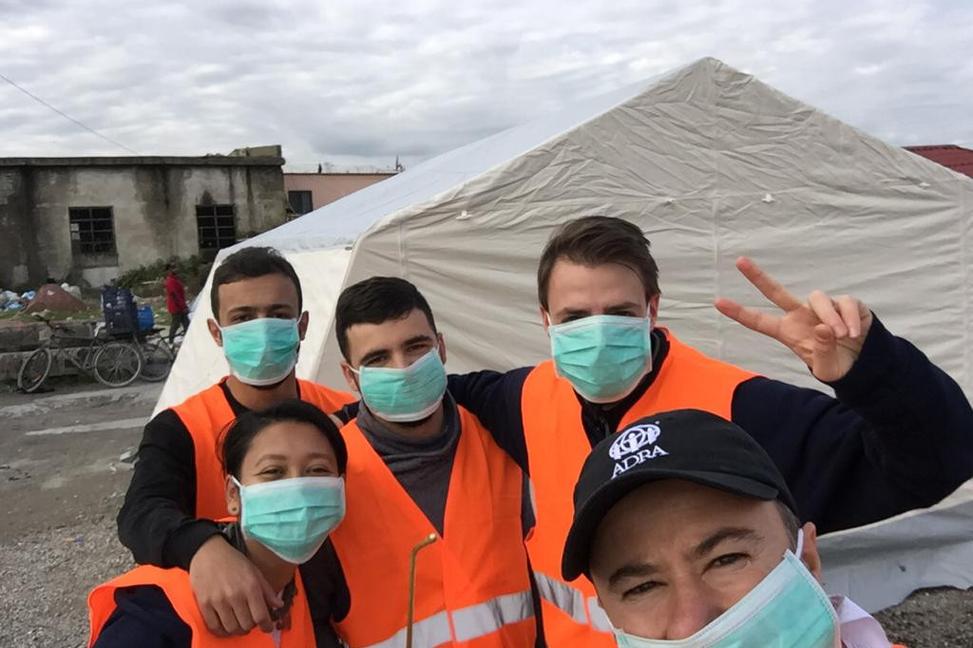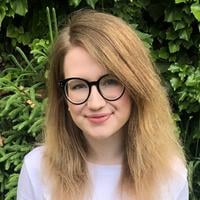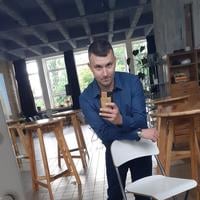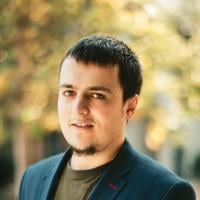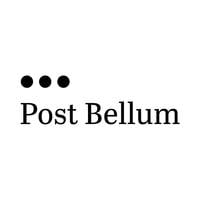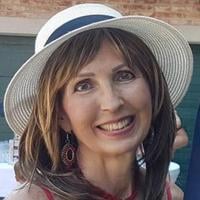My name is Martin Pavelka and I am an EU Aid Volunteer from Slovakia, currently deployed as a Volunteer & Program Coordinator in Istanbul, Turkey by French organization ADICE. Before coming to Turkey, I spent a year working as a SlovakAid Volunteer with internally displaced persons (IDPs) in Georgia as a Grant & Project Manager.

My host organization, Small Projects Istanbul (SPI), is an NGO with a mission to integrate and provide livelihood opportunities to 250+ displaced families from the MENA region. SPI is a community center with a women’s social enterprise branch called Muhra.
At SPI, I engage in various educational, recreational, psychosocial, and social cohesion activities to help the refugee community (mostly Syrian) better integrate into Turkish society. Turkey is currently a host to some 4 million refugees, the largest number worldwide. Unfortunately, the number of local organizations working with this population is not sufficient and their effectiveness is often questionable. SPI is a clear exception. However, due to the COVID-19 crisis, we’ve had to transform our projects and activities onto an online platform.
During my deployment in Georgia, I knew that I wanted to stay in the field of international development. The ‘EU Aid Volunteers' program allows professionals to spend a year in a development or humanitarian context and contribute to the growth of the local host organization. This was a great opportunity to experience something new and support the local environment with my skills.
Don’t Imagine Overcrowded Camps and Flimsy Tents
Me and my host organization SPI seek to help refugee families from the Middle East and North Africa by creating a safe place for them to learn, connect with each other and increase their livelihood opportunities. We not only work with children and young people but also with women. More than forty displaced women work in our social enterprise Muhra, where they create jewelry and sew sustainable clothing. All of them have the chance to participate in various trainings such as sewing, tailoring, 3D printing or computer courses.
As a Volunteer Coordinator, I am responsible for the recruitment, training, and retention of our volunteers, who are the driving force of our organization. Most of our volunteers are Turkish and Syrians but quite often we accept other candidates, mostly from Europe. Apart from volunteer management, I am responsible for implementing and monitoring of more than twenty activities on a weekly basis.

The community we work with is already established in Istanbul. Most of the parents go to work and their children go to school. Still, their biggest obstacles include social stigma, employability, and lack of funds.
In total, more than two hundred and fifty families are registered at SPI. Each family has four children on average. Though most of our beneficiaries come from Syria, we work with a number of families from other countries, such Iraq, Egypt, Morocco, and Palestine. They all have the status of ‘Refugee under temporary protection’.
Stories as Fragments from a Movie
Members of the displaced community have taken the difficult path of fleeing their homeland due to wars, persecution, and injustice. Now, they face challenges with integration into local Turkish society. Some stories that I hear from my Syrian friends and colleagues sound almost like fragments from an action movie. However, for them, it was a harsh reality. Now, they seem to be enjoying joyful moments more than the others. Sometimes I get invitations to drink tea or coffee at their home.
Our community faces many challenges, such as social isolation, language barrier, and difficulties accessing services and relevant information. They often don't know their rights and where to seek help. The Turkish bureaucracy is unreal. Processing one confirmation of residence or registration of a foreign mobile phone can take months. This naturally requires patience and financial resources. One of our goals is to serve as an information point to our community.
The Impact of COVID-19 Pandemic on Human Lives
Despite the current situation with COVID-19, I decided to stay in Istanbul. It is my home now. Overall, life in the city has calmed down but it has not completely stopped. Non-profit organizations often operate through grants from international donors. How development and humanitarian sectors will operate during this crisis is not clear.
The Coronavirus affected not only our organization but also our beneficiaries, the refugee community. Many families have lost their jobs and their source of income. As a response, we try to find ways to provide them with at least some financial assistance so they can cover their most basic needs. At the same time, we started distributing food packages to the most vulnerable families.
We also launched online activities, targeting children and young people. Through these efforts, we teach Turkish, provide homework support, and conduct creative activities. Online communication has its limitations but we have not been deterred. I believe that this program is a huge help to parents and relieves families of considerable stress from homeschooling.
Volunteering is Professionally and Personally Enriching
I work with a very international and diverse team where everyone comes from a different background. Therefore, I try to express my ideas simply and disassociate myself from my own norms and beliefs. I try to listen fully to what others say without the need to convince them of ‘my truth’. Thanks to intercultural sensitivity and communication skills, I feel that I can connect with various people - on both professional and a personal level. Additionally, I have become more resilient and internally strong and learned how to work with limited resources.
Working in a team in which everyone has a different mindset is always a bit challenging. Living in the context of other cultures is a great way to realize how much we don't know, how many cultures there are in the world, and that we are all interconnected. I also think it is necessary to constantly learn something and to regularly step out of one’s comfort zone. My actions will not save the world, it is more of a drop in an ocean. Illusions and exaggerated expectations from any humanitarian deployment must be set aside. Otherwise, there may be a great disappointment.
A short video about EU Aid Volunteers deployed in low-income countries on EU Aid Volunteers projects implemented by ADRA Slovakia.
Experiencing Migration on my own Skin
We often hear terms like migrant, asylum seeker, or refugee. It is important though to understand the differences between them. A migrant usually voluntarily crosses the borders of their own country. The reasons can be due to work, study, or volunteering. Refugees, however, flee their homes from war, persecution, loss of liberty, etc. If they stay, they would be in danger of death, torture, or imprisonment.
The media and educational institutions should be responsible for providing unbiased information about migration. Unfortunately, the opposite is often true, and only very extreme situations will be given space in the headlines of tabloid newspapers. Additionally, the phenomenon of climate change is having an increased impact on human lives and it will contribute to the migration of Slovakian people both within and to other countries. Then we will perhaps understand migration first-hand. When you meet refugees, you understand that on a human level, we are all equal. Prejudices are, however, deeply rooted in all of us. The change in perception will happen only if the civil society, the media, and local governments start to raise awareness and educate citizens about such topics.
In recent years, a lot has changed thanks to travel, study exchange, and globalization. For example, the elderly, through the experiences of their grandchildren, slowly become acquainted with the topic of diversity and sensitivity to other cultures. I hope very much that the global pandemic of the coronavirus does not slow down this movement.
Martin Pavelka
EU Aid Volunteer
This article was originally published on 9.6.2020: https://webgate.ec.europa.eu/echo/eu-aid-volunteers_en/node_en
During the period 2019/2020, Martin was a volunteer in Turkey in our partner organization Small Projects Istanbul. His deployment was a part of a project HVA - Humanitarian Volunteers in Action, where ADRA Slovakia in cooperation with organizations ADICE from France and MONDO from Estonia act as sending organizations. The project was funded by European Commission under EU Aid Volunteer Programme, managed by The Education, Audiovisual and Culture Executive Agency (EACEA) in cooperation with The European Commission’s Directorate-General Humanitarian Aid and Civil Protection (DG ECHO).
Martin continues volunteering on project SuDHAV 3 or Sustainable Development through Humanitarian Aid Volunteers 3. Follow our Facebook to learn more about Martin.

